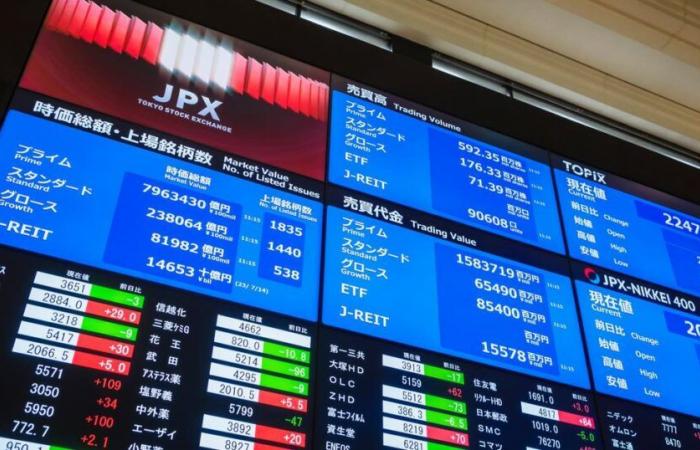The yen tried to rebound on Friday, after its plunge in recent days which supported the Tokyo Stock Exchange, in Asian markets without volumes, undermined by questions about the Bank of Japan and the future policies of Donald Trump. Friday around 06:30 GMT, the Japanese currency rose (+0.19%) to 157.69 yen, trying to catch its breath after falling Thursday evening to its lowest level since mid-July, at around 158 yen per dollar. . The Japanese currency fell this week against the greenback for four consecutive sessions, penalized by reduced trading volumes during this end-of-year holiday period and by questions about monetary policy.
Bank of Japan (BoJ) Governor Kazuo Ueda spoke last week of a prolonged pause in the institution’s monetary policy tightening, in the face of internal and international economic uncertainties, which had already caused the Japanese currency to fall. In another intervention, Kazuo Ueda explained on Wednesday that rates would continue to be “adjusted” if the situation continued to improve on the economic and price front: a lack of clear signal maintaining the perplexity of operators and therefore the slide of the yen.
Japanese rates which would be maintained at their still extremely low levels, despite two increases this year, would contrast with the high American rates which the Federal Reserve (Fed) only intends to lower gradually: a gap which favors investments in dollars, which are more profitable, to the detriment of the yen. However, some indicators published on Friday show a relative improvement likely to encourage the BoJ to resume its rate increases: acceleration of inflation in the Tokyo region, less pronounced fall than expected in industrial production in November and better sales details than expected. This flurry of statistics, as well as minutes from a BoJ meeting showing dissension within it, helped halt the yen’s plunge.
Also read
Have real estate companies finally hit rock bottom on the stock market?
Tokyo driven by weakened yen
On the Tokyo Stock Exchange, the flagship Nikkei index closed up 1.80% at 40,281.16 points, and the broader Topix index gained 1.26% to 2,801.68 points. The continued weakening of the yen this week helped to support the securities of exporting groups, whose international sales are favored by a depreciated currency. They continued to pull up the odds on Friday, like Fast Retailing, owner of Uniqlo (+2.70%), or Toyota (+1.30%). “With only two other sessions between now and the end of the year, discussions remain tenuous today”observed Tokai Tokyo Intelligence experts.
Caution was felt on the Asian markets, some of which reopened after the Christmas break: around 06:30 GMT, Seoul fell by 1.02%, against a backdrop of political uncertainties in the country, and in Hong Kong, the Hang index Seng was standing still (+0.05% to 20,108.65 points). In Seoul, E-Mart, the country’s largest hypermarket chain, tumbled 9.40%, hit by profit-taking after a jump of some 5% the day before: Chinese e-commerce giant Alibaba s is preparing to merge its activities in South Korea with the digital arm of E-Mart. The stock markets of mainland China stabilized in volatile exchanges: the composite index in Shanghai nibbled 0.04% and that of Shenzhen rose 0.26%.
The absence of a signal from Wall Street was cruelly felt: “American equity markets are paralyzed in a waiting phase, trading volumes having dried up with the end-of-year holidays”noted Stephen Innes, of SPI Asset Management. “The market just drifts until something shakes it out of its lethargy (…) perhaps a shift in the global economic mood with Donald Trump”who will arrive at the White House in January, he added. The oil market remained sluggish: around 06:30 GMT, a barrel of American WTI lost 0.09% to $69.56, and that of Brent from the North Sea lost 0.11% to $73.18.






